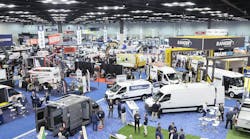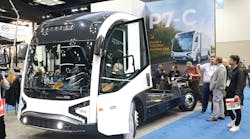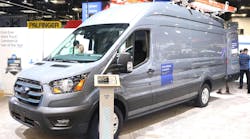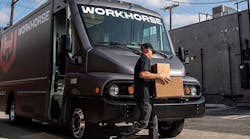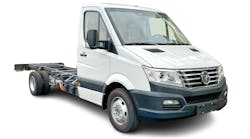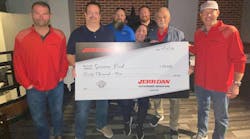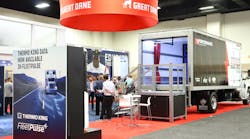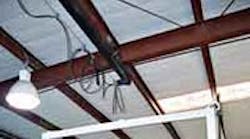IT BOGGLES the mind. And not just the mind of Rick Schell, general manager of America's Body Company's newest plant in La Grange, Texas. Rob Patterson, vice president of operations, can hardly believe it.
On September 1, 2006, Schell arrived in La Grange and stood on a 12-acre property containing a 55,000-square-foot facility that hadn't been used in five years and would have to be gutted.
By the end of October, ABC had progressed through the pilot and startup stages and was producing 25 van bodies a week.
By the spring, it was capable of producing over half of its estimated capacity of van bodies, platform bodies, and dump bodies.
And not just producing bodies, but quality bodies. In a three-month period starting in March, an internal audit showed that the La Grange plant had the best quality among all nine ABC plants.
“We're amazed at how far we've come,” Schell says. “It takes time to train people in this business. There is so much to learn. To get these products out on time with quality, I'm impressed with the labor pool here. People are very conscientious. We've had very little turnover. We have extraordinary quality and exceptional speed to market, and we're one of the few companies that has new products.”
If you're wondering why Leggett & Platt, ABC's parent company, would choose to establish a new plant in La Grange — a rural outpost (population 4303) dotted with oak, pecan, and pine trees, and situated where an old buffalo trail crossed the Colorado River — Schell has the answer: It's actually quite strategic.
Le Grange is 57 miles southeast of Austin, 105 miles northwest of Houston, 111 miles east of San Antonio, and 222 miles south of Dallas. It's situated in the middle of what he says is the second-fastest-growing market in the US for truck bodies, after Arizona.
“There is a lot of demand here,” he says. “Our only van body competition is south of Dallas and in San Antonio. Our feedback from dealers is that they wanted a manufacturer closer to this area. Before, they had to go to Dallas or San Antonio. We're right here in their backyard. We can give them better service closer to where they are.”
Schell says his Austin/San Antonio sales representative, Brant Hickman, already has become one of the top 10 salesmen in the company. He says Houston sales rep John Lyons is “doing a tremendous job.” And in mid-May, he hired a sales rep for Dallas: Brian Mckinzie.
“All of our customers have been more than happy with us,” inside sales rep Clifton Lewis says. “You're going to have some glitches, but nothing major. Our market share should improve dramatically over the next 90 days now that we've taken in Dallas. We're still working on getting a lot of the smaller dealerships involved, but a lot of the big accounts — Rush Truck Center and many Peterbilt, International, Isuzu, Hino, GM, and Ford dealers — are doing well for us. We can't say anything but that it'll be a bright future.”
The right man
Leggett & Platt believes Schell was the perfect person for this job. Schell previously contributed to the startup of two facilities.
Schell, who has been with ABC for 18 years, was the assistant plant manager in Tampa. The plant is situated on seven acres, with 33,000 square feet of production space. Before ABC purchased it in 1999, it was American Commercial Truck Equipment. It manufactures van bodies and offers a complete line of truck bodies and equipment, including ABC's exclusive products: Landmaster and Marauder.
Then Schell started and ran the Oldsmar plant in Florida — where flatbeds are built and service bodies are upfitted — for seven years.
“I have experience in how to set up plants,” he says. “I worked my way up in the company from the ground up. I can do almost any job in the whole place.”
When Schell arrived in La Grange, he and his staff cleaned and pressure-washed the manufacturing facility — which previously had been used by aircraft and cabinet manufacturers — while a construction company added 2200 square feet of office space. A new electrical system, cranes, and new fixtures were added.
“The place wasn't really built for what we do, so we did a lot of work,” he says.
Starting with the flatbed line, they built all their own fixtures and jigs, then moved to the van line and did the same, assembling all the fixtures they would need to manufacture the parts to assemble the bodies. Outside, at a cost of $25,000, they installed a wash bay with an EZ Environmental BioRack system, which integrates innovative technologies that allow workers to wash, rinse, and remediate wash water all within one closed-loop system. The bioremediation process converts oil and grease molecules into carbon dioxide, nitrogen, and water. Through the process of bioremediation, the BioRack provides purity and quality of wash water for easy reuse, saving money in water, sewer discharge, and labor.
“Nothing goes on the ground,” he says. “Leggett & Platt has strict environmental policies.”
After six weeks of work, Schell called Patterson and said, “We're about ready to go. Where are the sales guys? Let's go get them in line.”
“Now?” Patterson said. “Already?”
“Yes. We'll be ready to start building the pilot units by the end of October.”
Schell brought in Tampa plant manager George Rodriguez and trainers from other plants to help teach the 40 hired workers. (They have 58 now, and expect to have as many as 100 when production peaks.) The sales staff arrived the first week of November and hit the ground running.
“The people we have here are great,” he says. “Out of all of the plants we have set up, this one was the fastest and most efficient one we've had.”
Third-largest purchase
The birth of the La Grange plant fits into Leggett & Platt's design, just as the purchase of ABC did.
Leggett & Platt is a diversified manufacturer that conceives, designs, and produces a broad variety of engineered components and products that can be found in virtually every home, office, retail store, and automobile.
It is North America's leading independent manufacturer of: components for residential furniture and bedding; retail store fixtures and point-of-purchase displays; components for office furniture; non-automotive aluminum die castings; drawn steel wire; automotive seat support and lumbar systems; carpet underlay; adjustable beds; and bedding-industry machinery for wire forming, sewing, and quilting. Primary raw materials include steel and aluminum. Main operations include metal stamping, forming, casting, machining, coating, welding, wire drawing, and assembly.
The company, which had 2006 sales of $5.5 billion, ranks 419th in the most recent Fortune 500 list and has more than 300 facilities in more than 20 countries.
The purchase of ABC on October 31, 2005, was Leggett & Platt's third-largest ever, with approximately $150 million of annual revenue. Leggett & Platt took on 580 employees and 10 operating facilities.
With this acquisition, Leggett & Platt became the second-largest supplier in the $1.5 billion US market for light- and medium-duty commercial truck equipment.
Leggett & Platt believed that with a highly fragmented industry of many small, regional manufacturers, it would stand out by providing a wide range of products and service locations.
ABC, which has been using Leggett & Platt components, is part of the Commercial Vehicle Products (CVP) group, which also includes Masterack (commercial van and pickup equipment), Team Fenex (mobile power products and underground service vehicles), Crown North America (OEM vehicle programs and government sales), and Gamber-Johnson (docking stations and vehicle mounts). The CVP group falls under the larger umbrella of the Specialized Products segment, one of five in the company.
The Specialized Products segment designs, produces, and sells components for the automotive industry, specialized machinery and equipment, and van interiors and truck bodies for light- to medium-duty commercial trucks.
The key growth strategies for the CVP group are geographic expansion and new product development. The aim is to provide improved product functionality and quality to customers by focusing on product innovation, and use that to expand into the markets supplied by smaller regional manufacturers that have high concentrations of end users.
The company believes the purchase of ABC has provided “opportunities to consolidate operations, reduce administrative overhead, gain purchasing leverage, and penetrate additional geographic markets,” and says the CVP group should generate revenue of approximately $250 million.
Quality starts with team
The key to meeting that goal in La Grange is quality.
“It starts with a great work force,” says Phil Winkelmann, Leggett & Platt's director of operational excellence for commercial vehicle products, “but the key is to tap into expert knowledge on the shop floor. Anybody who comes to the company wants to be great. You want to provide an environment that allows them to excel. We really saw that early on.”
They started off by adopting 2"×3" internal quality stickers that read, BUILT WITH PRIDE IN TEXAS.
The idea of a sticker originally was suggested to Leggett & Platt's branch manager in Columbus, Ohio, by one of the company's major customers. The original sticker had ABC's name with its logo flag and the words BUILT WITH PRIDE.
“It has a line for the mechanic, supervisor, quality inspection and paint,” Winkelmann says. “When you get an order and take it to an area to build a truck, you have a quality checklist. After one area does its job, a technician fills out a section by answering some questions, then signs his initials on the checklist items and signs the quality sticker. Then the team leader comes by and checks off on the work and signs the sticker as well. It gets put in the door jam. The customer sees that the unit has been inspected and signed-off on. It helps produce confidence, quality, pride, and craftsmanship.”
Winkelmann, modeling the Toyota Production System, also helped La Grange's shop divide into six teams of up to 10 members per team, based on specific areas of the shop (frame welding, flooring, etc). They developed a team board for each area, each with the same key measurements: safety, quality, production, and cost savings. Once a week, each team meets to discuss issues and progress.
“The team tracks it themselves,” he says. “They own it. They understand the impact in their area of ownership. We discuss some of the opportunities. Within the quality process, we say either, ‘Great job,’ or ‘Hey, here are a couple of opportunities that the team sees to improve. We want to make sure we don't do that again.’ They talk about the root causes and create an action plan. It's plan, do, check, act, or the Deming Cycle.
“They're tracking something, finding out opportunities by doing a bar chart, working on corrective action to make sure the problems don't reoccur. If there are prior quality issues, the ball gets handed off to another team. Let's say Team 3 had a wiring issue that got caught, maybe by the next team down the line, or at final inspection. We would get that communication back to that team, not to demean anybody but to show them, ‘Hey, you had a wiring issue last week. What can we do to make sure this doesn't happen again?’
“During team meetings, when you talk about opportunities and root causes, we're talking to the experts. These are the people who work in that area day in and day out. A typical manufacturing engineering concept would be to have an engineer come into an area, evaluate, and make improvements. The Toyota Production System develops a system of team members who are all quality managers. We're looking to provide them with the tools and support they need to do that. They might say, ‘We have to drill a hole every day on this metal part that gets supplied by so and so. Can we get this stamped so we don't have to spend five minutes per truck?’ With that, there is a suggestion process. They get a small amount of recognition for coming up with ideas and following through with its implementation.”
On the issue of safety, the system includes a chart with blocks that represent each day of the month. At the end of the day, the team leader colors the block in green if there have been no accidents, yellow if there was a near miss or a hazardous situation that was avoided, or red if there was an accident.
The team holds a standing 10-minute meeting each week in its area, right there at their board.
“The itinerary for the meeting is right there — safety, and also includes cleanliness, attendance, quality, production, and cost (savings),” Winkelmann says. “They might say, ‘We have 11 months without an accident. If our team achieves its monthly goals, it gets recognition.’ The key is to provide a culture that enables that.
“We're on a lean journey that's going to take some time. When you change someone's philosophy and the way we do things, it takes a while. But they start to realize eventually that it's not just producing a product and getting it out the door. It's producing something you own and have pride in because it has quality and yourself in it.”
Best quality
When the La Grange plant compiled one of the best quality reports in ABC for that three-month period, it was for fewest defects per body — defects being imperfections that are caught somewhere in the process before the body goes out the door.
“The quality control manager goes over it, and any little defect is marked down,” Schell says. “If anything is not acceptable, it gets reworked, then it goes out the door. The customer gets a perfect body every time. If a defect is marked down, it goes against the specific team that was responsible.
“We go through a lot of steps to make sure the body's right before it goes out the door.”
New products
Another goal is to add to its reputation as one of the industry leaders in new products.
Schell says ABC's composite flatbed, developed at the Louisville plant, is one of “our leading exclusive packages.”
“When we first mentioned it in Texas, the response was: ‘We want treadplate steel,’ ” he says. “But we've shown them a DVD demo that illustrates how tough they are and how long they last, and they've agreed. They're lightweight, they'll never rust, and there's a lifetime guarantee.”
They're also in the process of designing a 30' mobile pharmacy truck with a cabover, walkthrough, and bathrooms. It's designed for the government to go to where people can't get to a pharmacy.
“We're going to go into difficult things,” he says. “We don't just build basic bodies. We're able to fabricate and do whatever the end customer needs. We don't turn down anything. We can pretty much do anything here, other than refrigerated units.”
As Schell looks around the plant, he sees a few things he'd like to tweak. He wants an overhang outside so that steel isn't exposed to the elements, another overhang at the wash bay, and a large paved area to replace dirt. In the future, he'd also like to see the purchase of 25 acres of adjacent property that he says is available and “would be perfect for us.
“Those are just little things,” he says. “I think everything is good. It'll be hard to tell until we get maximum sales and we're able to push the limit to see what we can do and what other things can help us. Until then, I think we're in really good shape.”
